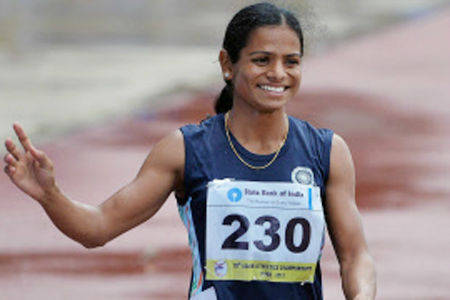The sprinter Dutee Chand leads a quiet, disciplined life. It involves attending classes for 9 hours at the Zonal Railway Training Institute in Bhusaval, a small town in Maharashtra almost 600km from Mumbai. At the institute’s large, leafy campus, Chand is one of only three women training to be ticket-checkers. After classes, she heads back to her hostel room and pores over study material. She has pencilled notes—abbreviations and chapter headings—on the room walls and on white charts; a desk with a laptop is within arm’s reach of her bed. It is a life some distance removed from what she has known so far, a life revolving around intense sprint training, workouts and competitions. It is even further removed from the storm now brewing— with her at its centre—that has the potential to change the world of sports. Though she has never competed at the senior level, the 18-year-old Chand is well known. In June, in a breakthrough in her fledgling career, she won two gold medals at the Asian Junior Athletics Championships in Taipei, Taiwan. Bigger stages awaited her—she was set to compete at the International Association of Athletics Federations (IAAF) World Junior Championship in the US and her name was under consideration for the 2014 Commonwealth Games (CWG) in Glasgow. But on 12 July, just ahead of the world championships and the CWG, Chand was summoned by the doctor at the Sports Authority of India (SAI) training centre in Bengaluru, where she was training. A series of tests were run, and three days later, she was told she would not be able to compete. No reasons were offered.
“My first thought was that I had been banned because I failed a dope test,” Chand says. “But I have never doped.” Confused and upset, Chand left for her home in Odisha. It was only there that she learnt, through news channels, that she had failed a “gender test”. Chand was completely bewildered by the news. It made no sense. What she did have, and did not know about, is a condition called hyperandrogenism. Her body produces a larger amount of the androgen hormone testosterone than the average woman. She was barred from competing because IAAF, the governing body for world athletics, introduced a rule in 2011 which states that women who naturally produce testosterone at levels usually seen in men will be ineligible to compete as women. The extra hormone gives them an unfair athletic advantage, IAAF’s reasoning went. Just before the 2012 Olympics in London, the International Olympic Committee (IOC) also adopted the rule.
Athletes who had hyperandrogenism had two options: Quit sports, or undergo a medical intervention involving surgery and long-term hormone-replacement therapy to lower androgen levels. Chand took the third option. She decided to challenge the ruling at the the Court of Arbitration of Sports (CAS) in Lausanne, Switzerland.
Read more at: http://www.livemint.com/Leisure/9P3jbOG2G0ppTVB7Xvwj0K/Why-Dutee-Chand-can-change-sports.html?utm_source=copy

